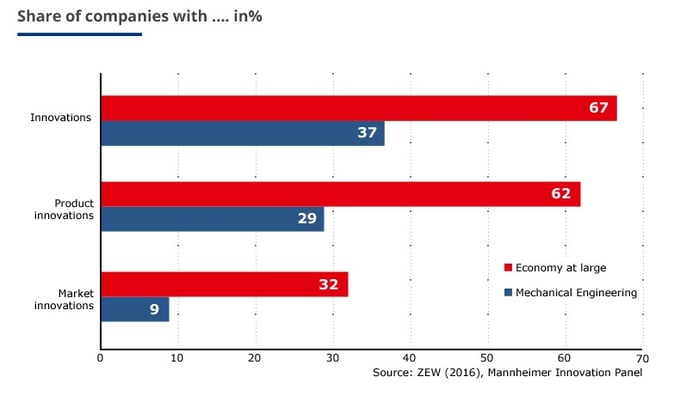Digital Change & Innovative Thinking

Topics as varied as Big Data, Industry 4.0, Digital Transformation, Crowdworking, Generation Y , Work 4.0 and 3D-printing have been discussed in 2016, and many of these will have significant influence on the working world over the next few years. This also applies to mechanical engineering. We would like to refer to three terms that have gained importance in 2016.
Digitization
Almost no other topic is currently as up-to-date as this one. Digitization has had a significant influence on our lives in recent years. The working world, too, has been changing like never before, and these changes affect both employers and employees. Many companies have recognized this and are training their employees to cope with these new challenges because digitization has also been making its way into the field of mechanical engineering.
“[Digital culture] should become such a part of everyday working life that the term itself becomes obsolete. In the future, there shouldn’t even be a ‘digital strategy’. It will simply be strategy in a digital world. At some point, technology will have become so integrated, such a normal part of everything we do, that we won’t need to talk about it separately”, states Marc Fontaine, Digital Transformation Officer at Airbus Group.
In the future, we have to be willing to face this change, jump in and embrace these new ideas.
Digitization will come. Faster than one might think. Due to further developments and advancements in industry, the requirements on employees are changing as well. For engineers this means to be and remain adaptive in the future. In addition, soft skills such as intercultural and business knowledge are necessary. The digital innovation also entails that skills in the field of programming and general information technology will become increasingly important. Consequently, the demand for continuing education and training will grow, because new requirements will steadily come up and engineers have to adapt themselves to these requirements. Therefore, further education and continual learning are appropriate measures to keep pace with these changes.
Work 4.0
The working world has not only changed because of digitization; people and their work habits have changed, too. Many employees are reevaluating life choices. The desire to balance work and family life is increasing and the boundaries between everyday work and private life are blurring. Work 4.0 does not only refer to the industrial sector (Industry 4.0), but rather to the forms of work themselves. According to the Federal Ministry of Labor and Social Affairs, the employment relationships will be “more interconnected, digital and flexible in future“. In this context, time sovereignty and work-life balance play important roles.
The employment relationships of engineers will change and become more and more negotiable with the employer.
Innovation
VDMA (Mechanical Engineering Industry Association) writes on its website “… the mechanical engineering industry is one of the most research-intensive industries in Germany. It accounts for one tenth of the business sector's expenditure on research and development (R&D) and for almost 12 % of its R&D personnel."

Yet, innovation is of essential importance in other sectors, too. New processes, new products and a future-oriented way of thinking are required. An engineer who wants to be successful in the long run must be innovative and break new ground. This calls for a proactive and often creative approach to work.
We are well prepared for the future in the field of mechanical engineering, can look back on 2016 with satisfaction and are ready to plunge into the next one.
RINGFEDER POWER TRANSMISSION wishes you a good start into the year 2017.


Comment